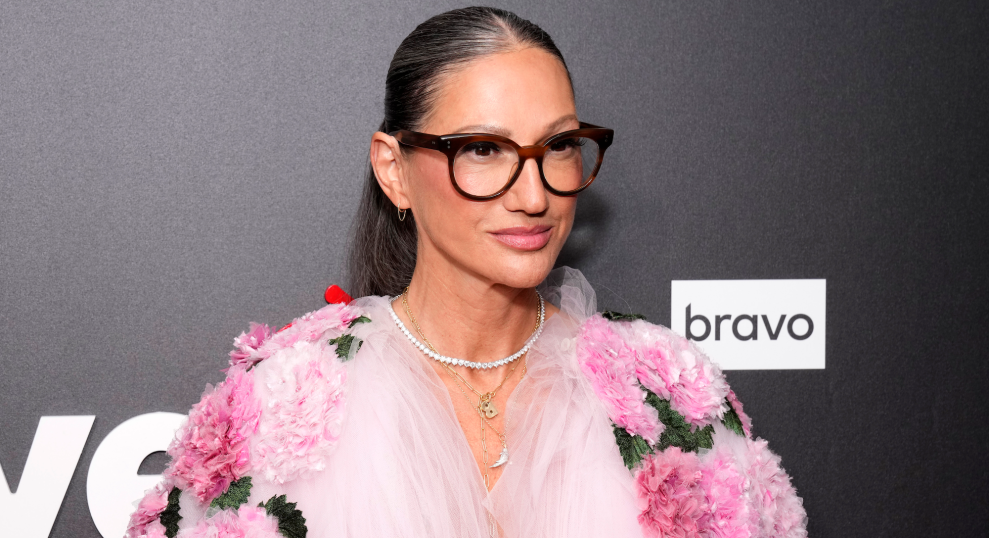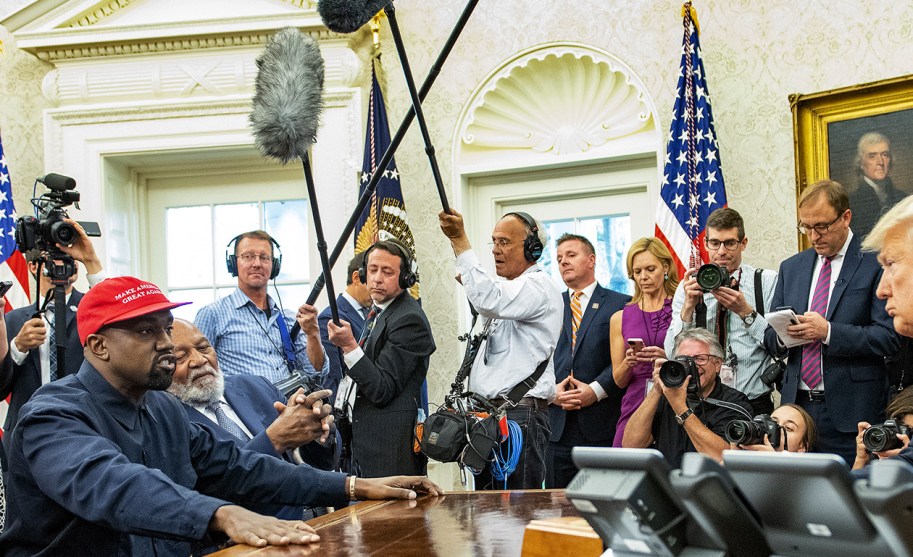When the US targeted Russia’s oligarchs after the invasion of Ukraine, the trail of assets kept leading to our own backyard. Not only had our nation become a haven for shady foreign money, but we were also incubating a familiar class of yacht-owning, industry-dominating, resource-extracting billionaires. In the January + February 2024 issue of our magazine, we investigate the rise of American Oligarchy—and what it means for the rest of us. You can read all the pieces here.
I’ll give the Kardashians this much: There’s nothing more relatable than fighting with your sister because she stole your favorite dress.
For the past 16 years, the Kardashian-Jenners have spun gold from the tumult in their personal lives through Hulu’s The Kardashians and its spiritual predecessor on E!, Keeping Up With the Kardashians. More than mere celebrities, the KarJenners are our most omnipresent cultural oligarchs, reaching into a stratosphere of wealth, pop-culture dominance, and political influence beyond that of ordinary reality stars. The five sisters clash and make up as sisters are wont to do: Kendall is furious that Kylie took Kourtney’s brown dress that she wanted, or Khloé is offended that Kourtney made fun of the color of her patio furniture covers. But in The Kardashians’ third season, which aired last summer, it was Kim and Kourtney who were locked in a months-long argument.
Kourtney, the family’s eldest, had married Blink-182 drummer Travis Barker in 2022, accomplishing what so many women born on the cusp of the ’80s once dreamed of. Her wedding was in Portofino, Italy, and featured several outfits designed by Dolce & Gabbana: Think black veils, corset-topped minidresses, bejeweled crosses, and draped fabric. A few months later, second-eldest Kim curated a collection with Dolce & Gabbana. The vibes, both of the collection and between the sisters, were off. “It’s just legit copying my wedding,” Kourtney wept to Kendall, the sleeves of her shirt soaking up her tears.
Predictably, Kim hit back. In a confessional interview memed to death on TikTok, Kim took a deep breath as if she were about to rewrite the Constitution. “I got married in Italy. Am I saying you copied me by getting married in Italy? Who performed at my wedding? Andrea Boccelli. Who performed at Kourtney’s wedding? Andrea Boccelli,” she said, referencing her 2014 wedding to Kanye West, something that definitely worked out and that we never heard about ever again. “You stole my fucking wedding country and my wedding performer…but I’m copying her Dolce Vita lifestyle?” Kim said all of this while dressed like drag Lucius Malfoy, sitting in what can only be described as the rich person’s chasm: a room decorated with nothing, just clean, ecru walls, ugly in only the way a rich person can make it ugly.
But cultural oligarchs just do things differently than the rest of us, and what better signifier of true wealth is there than fighting with your sister over who did a lavish Italian wedding first? Your garden-variety oligarch uses their wealth to hold on to power; the KarJenners have generated their own kind of power by compelling us to look at them for the better part of two decades. And the mundanity of their problems has proved to be some of the most compelling pieces of reality television—especially when those problems are the kinds that only rich people can have.
Within a particular subsection of reality television—that is, shows designed to be aspirational as opposed to revolting—wealth is demonstrated by how dumb, how insignificant, and how imminently solvable your problems are. Most of the fights fall into this exact category: shit too stupid to care about unless you’re stupid rich, in which case it’s the only shit worth caring about. “More money, more problems” was always a foolish adage; in reality, the more money you have, the more infinitesimal the problems. Rich people are lucky in so many ways, but chief among them is that they get to care about things that simply do not matter.
Kim and Kourtney are hardly the original archetypes. Back in 2002 and 2003, when The Osbournes and The Simple Life and Newlyweds: Nick and Jessica premiered on Fox and MTV, television producers realized that watching wealthy, enviable people could be even more addictive than watching poor people brawl on another season of Cops. One time boy-band member and now-time reality show host Nick Lachey and his then-wife, pop star Jessica Simpson, were rich, famous, young, and beautiful, and for three seasons you could watch them talk about how to effectively do the laundry.
Their attempts to appear down-to-earth didn’t fool us—their squabbles were silly but inconsequential, even if the laundry in question was a set of $1,400 sheets. But it was MTV’s My Super Sweet 16 that showed how even the extremely wealthy could still find a way to be inconsolable over their riches. The show premiered in 2005—just as many Americans were spending themselves into terrifying debt—showcasing an array of bratty teenage girls with the financial liberty (i.e., rich parents with no boundaries) to throw expensive, expansive, indulgent 16th birthday parties for themselves.
The joy of the show was not watching well-behaved little sweeties cheerfully accept a four-tiered cake and express gratitude for their blessings. No: My Super Sweet 16 was about watching some hellion in a Juicy Couture tracksuit fall into a paroxysm over her party invitations. Crying because your mom bought you a brand new Lexus convertible but gave it to you the day before your six-figure birthday party? As Kourtney once told Kim, to help her get a grip when she lost one of her $75,000 diamond earrings in a luxury resort in Bora Bora: “Kim, there’s people that are dying.”
But then, as income inequality has grown exponentially over the past three decades, why wouldn’t that disparity be even more apparent on reality television? Watching the wealthy gave the rest of us two ways to look at the extremely rich: one, where we could jeer at how inane and pathetic their quandaries are, and two, where we can admire the luxury contours of their lives. It is a brief panacea for our own agita about being able to afford being alive—if only a self-loathing one.
Bravo’s Real Housewives franchise was practically built off stupid fights blowing up the friend groups of ultrarich, mostly white women who are joyfully detached from the goings-on of the hoi polloi. The rawest pleasure of watching a Housewives episode is getting to take sides in a fight that truly has no winners. This season on The Real Housewives of Salt Lake City, Mormon tequila salesperson Lisa Barlow spent several episodes whining about having lost a $60,000 diamond baguette ring while flying to Palm Springs, right before crying about how she does not want to play along in a drag makeup competition because she spends $60,000 a year on her roving glam team and insists that no one else do her face.
Most of the Housewives want to be seen as relatable—a strange choice since it’s their most outrageous acts that make us want to watch them in the first place—and no surprise, they’re really bad at it: Lisa’s best attempt at approachability is crying because her ring, worth almost three times my undergraduate degree at my perfectly serviceable Canadian alma mater, maybe fell in the tampon disposal at a public airport. Frankly, it’s inspirational. (A close second is new cast member Monica Garcia, who wept about how she bought a Louis Vuitton bag just to fit in with her new rich friends. Don’t you just hate it when you purchase a $4,000 bag? I hate it when I do that!!!)
These arguments are rarely directly about their wealth, but the more inane an argument, the more their wealth subtly supports what they’re able to waste their time on. Time and energy, like money, is a finite resource for most people, but the more money you have, the more time you can buy to yell at your friends on an island somewhere, a camera following you around as you choke down another lychee martini.
When Dorinda Medley and Bethenny Frankel fought in season 10 of The Real Housewives of New York, it was ostensibly because Dorinda had gotten a gift for Bethenny’s daughter and didn’t feel adequately thanked. The gift was a sold-out, human-size Nutcracker from FAO Schwarz. (Who knows how much that one cost, but FAO currently sells a Swarovski-crystal-covered, 20-inch version for $5,600.) It’s the kind of gift that can only be purchased comfortably if you’re extremely rich, and can only be tracked down if you have the kind of free time that wealth affords you in the first place.
But such is another benefit—or maybe, one key tragedy—of being part of the 1 percent. Your problems get dumber and dumber and dumber, until you can’t even see their own ludicrousness. To the rich people having these fights, their outcomes are of paramount import. No one can just let something go.
That provides something for the rest of us, we the plebeians who tune in to watch the squabble. For a few moments every week, we can cosplay as the rich and unencumbered. We watch to be disgusted, sure, but there’s some warped pleasure in lusting over the lifestyle, like when you tongue an active canker sore in your mouth even though it mostly feels bad.
When Mary Fitzgerald bristles on Selling Sunset season 4 after Christine Quinn crashes her dogs’ birthday party, viewers get to pick a side, draw our own allegiances, and live vicariously through someone whose biggest problem includes the words dog birthday party. “She always makes everything about her,” Fitzgerald says when Quinn shows up at the party she threw for her dogs, who do not know what a party is. “This is my dogs’ party. It’s not about me. It’s the dogs.”
As viewers, we can briefly place ourselves in her shoes. Were I rich enough to throw a poolside party for my dogs, complete with signature cocktails, my wallet fat with Netflix checks, how mad would I be if that party were, say, ruined by a fellow leggy blonde?
The women of Selling Sunset are pretty rich themselves, but there’s an extra frisson in watching them cater to the obscenely rich, much like the staunchly middle-class cast members of Bravo’s Below Deck or Vanderpump Rules. The pinnacle of success on such shows is to become infamous enough to become solidly wealthy yourself. The broke 30-year-olds of Vanderpump Rules are now cresting into their 40s, and rich enough for warring pool parties at which all their functional alcoholic friends are forced to pick sides.
In any case, there’s something so juicy about being rich and petulant at the same time, and something soothing about seeing wealthy people just as miserable and unsettled as the rest of us. Indeed, who among us, the great unwashed, would want to watch these shows if the people on them weren’t so peevish? There’s no schadenfreude in watching the wealthy be happy. We should be angry with them for their perverse displays of affluence—just thinking about how much Khloé Kardashian likely spends on balloon arches for her children’s birthday parties is giving me dry mouth—but instead, we laugh at them. It’s a kind of inoculation for both parties: Laughter helps take the sting out of the enormous wealth inequity on display, and they skate on by without taking any real accountability.
And to someone like Kim Kardashian or Lisa Barlow, these problems are pretty much their only problems. To care intensely about things that do not matter—dog birthday party—is to signal that your wealth takes you to a stratosphere that the rest of us will never access. There’s no need to fret about things that someone like myself might worry about. I’m at risk of losing my health insurance, but Kim and Kourtney are at each other’s necks trying to organize the schedule for the annual Kardashian Khristmas Kard.
But in that way, rich people are just like us. They, too, are wasting time fighting with their sister; they just happen to have no credit card debt. And look, if I don’t have the means to undercut my sibling through a multimillion-dollar deal with designers repeatedly accused of racism, you better believe I’m gonna tune in to watch someone else fight the good fight.














